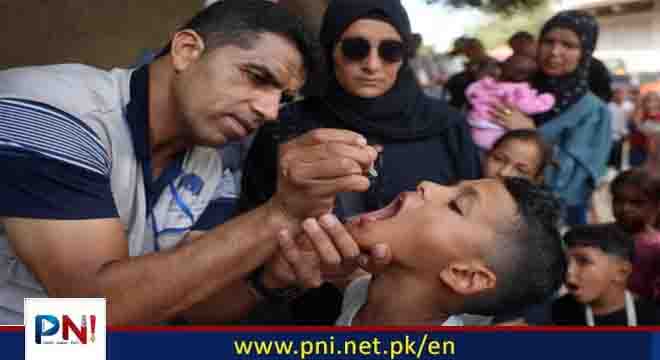UNITED NATIONS, Sep 02 : The UN-led mass polio vaccination campaign entered its second day in central Gaza on Monday with pauses in Israeli attacks holding sufficiently for thousands more children to receive their dose, in addition to the 87,000 who received their first round on Sunday, UN agencies said.
“There were 87,000 vaccinated on the first day out of 156,000 that we are hoping to reach in the Middle Area,” said Louise Wateridge, Senior Communications Officer for UNWRA, the largest UN agency in the Gaza Strip.
“It’s very promising that already, we have heard interest from parents who have come from Khan Younis, who have come from the southern area, and are asking our staff there and asking our teams, ‘When is the vaccination going to be available for us? When can we take our children?’”
Ms. Wateridge emphasized the urgent need for a ceasefire for the inoculation campaign to be successful, along with the release of all hostages taken on 7 October.
“What these children need most is a ceasefire now,” UNRWA said on X.
Speaking on day two of the vaccination drive, Ms. Wateridge reported seeing “hundreds of children” at a health centre in Deir Al-Balah and more at an UNWRA school in the central city. “The school reported that 3,000 children were vaccinated yesterday alone, so you know we’re seeing very good numbers and [need] to keep the momentum going,”
On Sunday, vaccination teams operated at UNRWA health centres, mobile medical points, and tents, with similar arrangements in place for Monday. “We are doing everything possible to ensure that all children under the age of 10 are vaccinated. Temporary pauses in the conflict are essential for delivering these vaccines,” UNRWA added on X. “Beyond the pause, these children need a vaccine that has already been delayed for too long.”
The initial three-day campaign in Gaza’s Middle Area to protect around 640,000 Palestinian youngsters from the highly infectious disease comes after health authorities detected the first case of polio in Gaza in 25 years. To offer maximum protection, children will need to receive two doses of the vaccine at a four-week interval. More than 1.2 million vaccine doses have been delivered to Gaza, with an additional 400,000 doses expected soon.
UN agencies UNRWA, the UN World Health Organization (WHO), the UN Children’s Fund (UNICEF) and Palestinian health authorities aim to achieve at least 90 per cent vaccination coverage in each round of the campaign to curb the current outbreak and prevent the international spread of polio.
Amid outbreaks of hepatitis, diarrhoea and other preventable diseases linked to 10 months of heavy Israeli bombardment and clashes with Hamas fighters, UN agencies underscored the need to for all warring sides to maintain the agreed eight-hour pause in hostilities.
“One of the biggest challenges is actually safely distributing the vaccinations because we have some areas in these so-called [humanitarian] pause zones between 6am and 2pm, there needs to be no fighting,” UNRWA’s Ms. Wateridge told UN News, a media website. “We are still struggling to get access to facilities and access to families and children in those areas. It’s far too dangerous for them to travel, to move; there is ongoing fighting.”
Ms. Wateridge reported “a lot of strikes” on Monday morning and through the night on Sunday. “So the fighting has not stopped by any means. There are some pauses throughout the day, but it’s not guaranteed. We don’t have guaranteed safety to people, and we really need that to reach all the children to get that 90 per cent success rate.”
Last week, Israeli authorities agreed to a series of three-day “humanitarian pauses” in central, southern, and northern Gaza, allowing the vaccination campaign to proceed.
The UN health agency WHO welcomed these pauses but reiterated that ultimately, “the only solution” to safeguard the health of Gaza’s children was a ceasefire. “The best vaccine for these children is peace,” WHO Director-General Tedros Adhanom Ghebreyesus said.
The vaccination drive faces significant challenges, including ongoing fighting, devastated roads, and hospital closures caused by the conflict. According to the WHO, insecurity, damaged infrastructure, and population movements make it unlikely that three days in each area will be sufficient for adequate coverage. “It has been agreed that the vaccination period will be extended by a day if necessary,” the WHO noted, stressing that vaccination teams must be protected and allowed to conduct their work safely.
The campaign comes amid a severe humanitarian crisis in Gaza, where the conflict between Israel and Hamas, coupled with Israel’s blockade of the enclave, has led to acute shortages of food, drinking water, and medical supplies. The worsening situation has raised fears of further disease outbreaks, not limited to polio.
“Today, children in Gaza are receiving the vaccines they so desperately need,” said WHO Chief Tedros Adhanom Ghebreyesus on X. “Ultimately, the best vaccine for these children is peace.”
Latest UN data indicates that approximately 90 per cent of Gaza’s 2.3 million residents have been displaced within the besieged territory, with hundreds of thousands crowded into overcrowded tent camps. Some enjoyed rare respite from intense fighting that has devastated much of the Gaza Strip.
“The one thing I noticed yesterday was, you know, going an hour without hearing a bomb,” UNRWA’s Ms. Wateridge said. “Going an hour without hearing a strike…it was noticeable that there was a calmer and quieter day yesterday because it has been so relentless for the last few weeks and also so many evacuation orders; 16 evacuation orders in August alone. Thousands, hundreds of thousands of people and families and being forced to flee.”
Follow the PNI Facebook page for the latest news and updates.









